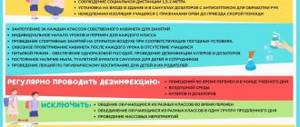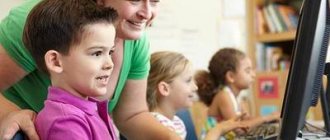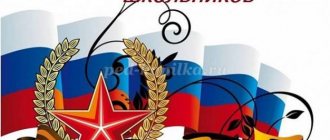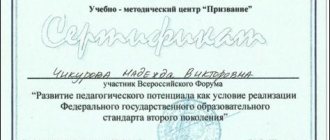Topics for self-education for primary school teachers
- Updating the possibilities of problem-based learning.
- Types of vocabulary work in Russian language lessons
- Types of creative written work.
- Introduction into practice of modern educational technologies aimed at developing the reading competence of junior schoolchildren
- The influence of teacher ICT competence on improving the quality of students’ knowledge
- The influence of group and pair work on the development of motivation
- Activity method in the development of cognitive processes (in extracurricular activities)
- Entertaining problems in a mathematics course.
- The use of innovative technologies as a means of enhancing the educational activities of primary schoolchildren
- Research activity of students as a means of realizing personality in the general educational space.
- The child’s research position as a factor in the development of giftedness
- Use of information technologies in education.
- The use of ICT technologies in the activities of primary school teachers.
- Use of information technologies in education.
- An activity-based approach to teaching as a factor in the development of the personality of a primary school student.
- Studying Microsoft Office Power Point and using electronic presentations in elementary school lessons
• The use of multimedia didactic tools in lessons in primary school • The use of ICT in the activities of a primary school teacher • The use of multimedia presentations to increase the effectiveness of the lesson • The use of ICT in lessons in primary school • Game activities in the GPA • ICT in a literacy lesson in 1st grade • Use didactic games in literary reading lessons to develop children's memory and imagination • Use of modern educational technologies in the formation of key competencies of primary school students • Use of the capabilities of the Panabord interactive board in science lessons in the formation of students' cognitive activity • Use of problematic technologies in mathematics lessons in primary school • Use of ICT - technology in primary school - as one of the conditions for improving the quality of education • The use of ICT in lessons of the surrounding world • The use of ICT in the educational process in order to develop the intellectual abilities of students. • Using ICT in mathematics lessons to improve the quality of education for primary school students. • Use of problem situations in mathematics lessons. • Study and implementation of project activities (individual and collective) at the Harmony educational complex. • The use of didactic games in writing and speech development lessons in a correctional class. • Use of information technologies in teaching primary schoolchildren. • Class teacher - coordinator of school, family and society • Club hour • Criteria-based assessment in elementary school. • Monitoring educational achievements on the topic: “Unstressed vowel” • Mastering the methodology for designing the concept of development of universal learning activities (UAL) for primary general education • Organizing extracurricular activities for schoolchildren at the initial stage of education. • Organization of extracurricular activities for schoolchildren at the primary stage of education. • Teaching dynamic reading in the light of new educational standards of education.” • Assessment of the achievements of the planned results of mastering basic educational programs in 4 grades. • Organization of group work • Features of the implementation of the Federal State Educational Standard in the OS "School 2100" • Mastering the capabilities of the new operating system as part of increasing ICT competence with practical application in mathematics lessons • Features of the implementation of the Federal State Educational Standard in the OS "School 2100" • Project-based extracurricular activities of primary school students as condition for the development of their creative abilities • Project activity of junior schoolchildren, as a factor in the success of education and training • Use of ICT in elementary school • Construction of the educational process at the elementary level in accordance with the requirements of the Federal State Educational Standard. • Problem-based learning as a means of activating students' cognitive activity. • Improving the quality of the lesson through the use of health-saving technologies in the learning process. • Problem-based learning in a literacy lesson (literary reading) in primary school according to the “21st Century School” program. • Project activities in the classroom and outside of class • Project activities in the lessons of the surrounding world • Application of ICT in the lesson of the surrounding world in 4th grade • Application of ICT in Russian language lessons in 2nd grade • Application of ICT in the lesson of the surrounding world in 2nd grade • Design and research activities in primary school lessons • Increasing ICT competence, mastering the possibilities of using the Panabord interactive whiteboard in science lessons • Improving the quality of education in mathematics lessons in 1st grade by using the mimio program • Increasing ICT competence, mastering the possibilities of using the mimio program in Russian language lessons • Improving the quality of teaching through the use of the Panabord interactive board in history lessons • Using information technology to develop the creative abilities of students in accordance with the requirements of the Federal State Educational Standard. • Improving the quality of reading and writing in junior schoolchildren who have deficiencies in the sound analysis of words • Improving the quality of reading and writing in junior schoolchildren who have deficiencies in the sound analysis of words • Problems of continuity between the primary and secondary levels, ways to solve them • Problematic situations in the classroom. • Project activities of students as a means of developing key competencies • The correct psychological attitude of students, as one of the factors for the successful education of younger schoolchildren. • Solving spelling problems as a means of developing a literate personality. • Development of students' speech as one of the main tasks of primary education. • Development of students’ mathematical abilities within the framework of the “Schools 2100” program, as a means of enhancing educational activities. • Role-playing as an interactive teaching method • Development of logical thinking in the process of teaching mathematics • Development of creative activity in lessons around the world through the introduction of ICT • Development of creative abilities of primary schoolchildren based on the use of non-traditional forms and methods of teaching • Development of students’ oral speech based on creative abilities • Solving simple problems is the basis for successfully mastering methods for solving compound problems • Development of speech ml. schoolchildren • Working with gifted children • Working with a hyperactive child • Development of creative abilities and creative thinking in GPA students • Development of spelling vigilance • Development of students in the process of forming universal educational actions • Development of children's creative abilities in work activities in the context of the implementation of the Federal State Educational Standard • Development of cognitive abilities for younger schoolchildren • Development of creative thinking in mathematics lessons • Development of students' creative abilities in literary reading lessons. • Development of creative thinking of junior schoolchildren in mathematics lessons. • Development of logical thinking in mathematics lessons. • Development of speech with elements of developmental education in reading and Russian language lessons • Development of mental calculation skills in mathematics lessons • Development of speech in lessons • Development of oral calculation in mathematics lessons, activation of students in all lessons • Development of spelling vigilance • Improving the system of pedagogical diagnostics with the aim of improving the quality of student learning. • Creating conditions for the formation of positive emotions in students in relation to educational activities • Creating a health-saving environment in physical education lessons, taking into account the individual characteristics of children. • Testing as a means of organizing control in elementary school • Forming in students the habit of systematic physical exercise through physical education lessons and extracurricular activities. • Formation of a team, development of independence in the classroom • Formation of spelling vigilance in Russian language lessons • Three components in raising children: family, school, society • Technology for forming the type of correct reading activity • Testing as one of the forms of technology for assessing planned results • Technology for the development of critical thinking • Technology of problem-based dialogue learning • Technology of differentiated learning • Formation of communicative competence of junior schoolchildren in the classroom and outside of school hours • Formation of students’ readiness for final testing in elementary school. • Formation of cognitive motivation in Russian language lessons in elementary school • Formation of spelling vigilance in younger schoolchildren in Russian language lessons • Formation of a healthy lifestyle and nurturing a culture of health among students. • Formation of expressive reading skills. • Physical education and health work in the GPD • Formation of project activity skills of junior schoolchildren in extracurricular activities • Formation of cognitive activity in mathematics lessons through the use of modern information technologies • Formation of spelling vigilance in Russian language lessons through the use of modern information technologies • Formation of general educational skills in self-organization of educational activities in students primary schoolchildren in the context of the implementation of the Federal State Educational Standard • Formation of communicative universal educational actions • Formation of universal educational actions for primary school students • Formation of the needs and skills of a healthy lifestyle in children of primary school age • Formation of mental arithmetic skills through the use of interactive methods and forms of teaching • Formation of self-esteem of students in the structure of educational activities within the framework of the Federal State Educational Standard of the second generation of educational institutions • Effective methods and techniques for teaching reading.
Individual self-education plan
Individual self-education plan
Filippova Elena Borisovna,
primary school teachers MBOU "Undino-Poselskaya Secondary School"
Methodological topic: “The use of ICT technologies in the educational process of primary school”
Self-education goals:
1.
Studying and testing ICT
2.
Improving the methods of teaching subjects as part of the introduction of the second generation Federal State Educational Standard.
3.
Improving professional skills in the use of ICT technologies in primary school lessons.
Tasks:
study of information and communication technologies;
active use of information and communication technologies (ICT) to solve communication and cognitive problems;
development of meta-subject skills of students: universal learning activities (cognitive, communicative);
develop the creative potential of students and create the necessary conditions for enhancing the cognitive and speech activity of students;
introduction of interactive forms of organizing the educational process in order to develop ICT competencies and increase students’ motivation to learn;
improving the quality of educational and extracurricular activities as a result of the use of ICT technologies.
Main directions of self-education:
professional (subject of teaching) and methodological (pedagogical technologies, forms, methods and techniques of teaching, information and computer technologies);
psychological and pedagogical (focused on students and parents),
health protection;
psychological (image, communication, art of influence, leadership qualities, etc.);
legal;
aesthetic (humanitarian).
Sources of self-education:
Specialized literature (methodological, popular science, journalistic, fiction), Internet; media information on various media, seminars, conferences, experience exchange events, master classes, advanced training courses, exhibitions.
Forms of self-education:
Individual - through an individual plan, group - through participation in the activities of school and district methodological associations of primary school teachers, pedagogical websites, as well as through participation in the life of the school.
Expected result of self-education:
development of educational work programs, scenarios for extracurricular activities using ICT;
development of didactic materials, tests, visual aids, creation of an electronic set of pedagogical developments;
development of methodological recommendations for the use of new information technology in extracurricular activities;
development and conduct of open lessons, master classes, generalization of experience on the topic under study;
reports, speeches at meetings of the ShMO, participation in competitions and conferences with self-generalization of experience.
Planned results of self-realization:
Development of a set of electronic extracurricular activities
Development of a package of material in electronic form, including:
set of didactics on the subject (presentations)
set of handouts (cards, assignments and tests)
collection of crosswords;
a package of materials on one of the pedagogical technologies (interactive, differentiated learning using game moments),
databases of teaching methods,
a package of scenarios for extracurricular activities using information technology,
a package of forms and sample documents for teaching activities (various certificates, questionnaires, plans, etc.),
a set of extracurricular subject activities (cognitive games, competitions, performances),
package of psychological and pedagogical materials for educators.
PLAN
| № | Sections of the plan | Contents of the activity | Deadlines | Form results |
| 1 | Study of psychological, pedagogical, methodological literature | 1. Reading scientific and methodological literature 2. Review of information on mathematics, pedagogy, psychology, and innovative technologies on the Internet 3.Studying the work of the best teachers in the school, district and republic | Systematically | Notes Reminders Recommendations. Electronic piggy bank of teaching materials (both our own and the country’s teachers) |
| 2 | Development of software and methodological support a) scientific and methodological work | 1. Study and implement technology into the practice of your work based on the motivation and activation of students. 2. Organization of design and research work of students. | Systematically | Programs and plans for educational work. |
| b) Experimental work. | 1. Development of a plan for educational work using ICT | 2015-2020 academic years | Training work programs, Testers Programs, Methodological and didactic materials | |
| 3 | Study of information and communication technologies. | 1. Mastering new computer programs and TSO (interactive whiteboard, computer). 2. Package development material in electronic form. | Systematically | Lesson notes. Methodological and didactic materials. |
| 4 | Participation in methodological school and district associations, in the life of the school | 1. Conducting open events, master classes 2. Speech at a meeting of the ShMO with self-analysis 3. Communication with colleagues at school, district | During the year, according to the ShMO plan | Summaries of events, including those attended |
| 5 | Participation in regional, regional and all-Russian competitions, etc. | Provide student work at regional, regional and all-Russian creative competitions and Internet sites | Systematically | |
| 6 | Self-generalization experience | 1. Development of notes 2. Development of individual differentiated tasks for students. 3. Development of a set of electronic tests. 4. Participation in competitions, conferences, seminars, and Internet sites. 5. Publications on Internet sites. 6.Self-analysis of work 7.Creative report 8. Electronic portfolio. | During a year | Sets of methodological and didactic electronic materials |
| 7 | Training | 1. Attending the lessons of your colleagues. 2. Taking advanced training courses. 3.Participation in webinars | During a year |



